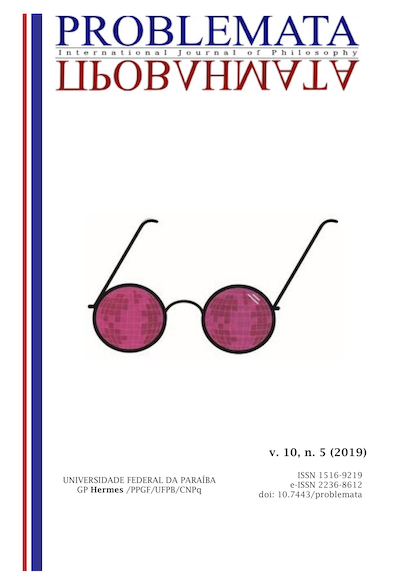ENTRE SHARON STREET E ADAM SMITH:
UMA ANÁLISE DA INFLUÊNCIA EVOLUTIVA SOB A MODULAÇÃO DO SENTIMENTO DE SIMPATIA
DOI:
https://doi.org/10.7443/problemata.v10i5.46101Palavras-chave:
Simpatia, Evolução, Moral, SentimentoResumo
Considerando o ponto arquimediano entre política, economia e moral na tríade de Adam Smith, a simpatia será analisada a partir de sua possível natureza biológica evolucionista e implicações metaéticas. Pautada nessa investigação, buscaremos propor em que medida esse sentimento poderá oferecer alternativas que amenizem problemas contemporâneos globais, tais como: crises econômicas, guerras e intolerância. Para isso, utilizaremos como fios condutores as obras: Teoria dos Sentimentos Morais e Riqueza das Nações de Adam Smith, A darwinian dilemma for realist theories of value de Sharon Street e O acaso e a Necessidade de Jacques Monod.
Downloads
Referências
BARAVALLE, “As muitas faces do altruísmo: pressões seletivas e grupos humanos”. Scientiæ Studia. São Paulo, v. 12, n. 1, p. 97-120, 2014.
BARD, K. “Neonatal imitation in chimpanzees (Pan troglodytes) tested with two paradigms”. Animal Cognition, 10, 233-242, 2007.
COSTA, T. A; BARBOSA, E. “A economia internacional como promotora do desenvolvimento humano a partir da releitura de Amartya Sen sobre a teoria de Adam Smith”. Conjectura: Filosofia E Educação 23 (2), p. 402-418, 2018.
FOGLE, T. “Are genes units of inheritance?”. Biology and Philosophy, v.5, 1990.
GUIMARÃES; MOREIRA. “O conceito sistêmico de gene – uma década depois”. Auto-organização: estudos interdisciplinares. Campinas: CLEUnicamp. v. 2, p. 248-80, 2000.
HUME, David. Treatise of Human Nature. Oxford: Oxford University Press, 2000.
______. “Of the Standard of Taste”. Essays, Moral, Political and Literary. Indianápolis: Liberty Fund., p. 227-249, 1987.
HUTCHESON, F. “Uma investigação sobre o bem e o mal do ponto de vista da moral”. Filosofia Moral Britânica: textos do século XVIII. Campinas: Ed. Unicamp, 1996.
______. An inquiry into the original of our ideas of beauty and virtue: in two treatises. Indianapolis: Liberty Fund, 2004.
KELLER, E. F. O século do gene. Belo Horizonte: Crisálida, 2002.
______. “The century beyond the gene”. Journal of Biosciences, 30, 1, p. 101-8, 2005.
LALAND, K.; BROWN. G. Sense and Nonsense: Evolutionary Perspectives on Human Behaviou. Oxford: Oxford University Press, 2002.
MONOD, J. Chance and Necessity. New York: Randon House, 1970.
MORROW, G.“The significance of the sympathy in Hume and Adam Smith”. Philosophical Review, n. 32, 1924.
______. The Ethical and Economic Theory of Adam Smith. Nova York: Longmans, Green and Co., 1969.
PORTIN, P. “The concept of the gene: short history and present status”. Quarterly Review of Biology, 56, p. 173-223, 1993.
PRESTON, S; WAAL, F. “Empathy: Its ultimate and proximate bases”. Behavioral and brain sciences. 25, p. 1–72. 2002.
RICHERSON, P; BOYD, R. Non di soli geni. Come la cultura ha trasformato l’evoluzione umana. Torino: Codice Edizioni, 2006.
ROSENBERG, A. Darwinism in philosophy, social science and policy. Cambridge: Cambridge University Press, 2000.
______. Darwinian reductionism, or, How to stop worrying and love molecular Biology. Chicago: The University of Chicago Press, 2006.
______. Philosophy of biology: a contemporary instroduction. New York: Routledge, 2008.
SANTILLI, E. “Níveis e unidades de seleção: pluralismo e seus desafios filosóficos”. Filosofia da Biologia. São Paulo: Editora Artmed, 2011.
SEN, Amartya. Adam Smith and the Contemporary World. Erasmus Journal for Philosophy and Economics, Volume 3, Issue 1, Spring, p. 50-67, 2010.
______. Adam Smith’s market never stood alone, 2009a. Disponível em: https://www.ft.com/content/8f2829fa-0daf-11de-8ea3-0000779fd2ac. Acesso em 28 de novembro de 2018.
______. Capitalism Beyond the crisis, 2009b. Disponível em: http://www.nybooks.com/articles/2009/03/26/capitalism-beyond-the-crisis/. Acesso em 04 de dezembro de 2018.
______. On ethics and economics. Oxford: Clarendon Press,1987.
SMITH, Adam. An Inquiry into the Nature and causes of the wealth of nations. Chicago: The University of Chicago Press, 1776.
_____. O Inquérito sobre a natureza e as causas da Riqueza das Nações. Lisboa: Fundação Calouste Gulbenkian, 2014.
______. Teoria dos Sentimentos Morais. São Paulo: Wmf Martins Fontes, 1999.
______. The theory of Moral Sentiments. Cambridge: Cambridge University Press, 1759.
SOBER, E.; WILSON, D. S. “El comportamiento altruísta”. Evolución y psicología, Madrid: Siglo Veintiuno, 2000.
STANFORD ENCYCLOPEDIA. 2018. Disponível em: https://plato.stanford.edu/entries/morality-biology/. Acesso em 11 de dezembro de 2018.
STOCKER. Adam Smith, the city, natural order, republicanism. Disponível em: <http://istanbulfactsandideas.blogspot.com.br/2009/08/adam-smith-city-natural-order.html>. Acesso em 25 de julho de 2018.
STREET, Sharon. “A darwinian dilemma for realist theories of value”. Philosophical Studies V. 127 (1), p.109-166, 2006.
TAVORY, I.; GINSBURG, S.; JABLONKA, E. “The Reproduction of the Social”. Developing Scaffolds in Evolution, Culture, and Cognition. Cambridge: MIT Press Scholarship Online, 2013.
UNITED STATE OF AMERICA. Human Genoma Project Informatio Archive http://www.ornl.gov/sci/techresources/Human_Genome/glossary/glossary_g.shtml. Acesso em 01 de novembro de 2018.
VENTER. C. “The sequence of the human genome”. Science, 291, p. 1305-51, 2001.
WILLIAMS, G. Adaptation and Natural Selection: a critique of some current evolutionary thought. Princenton: Princenton University Press, 1966.
Downloads
Publicado
Edição
Seção
Licença
Autores que publicam nesta revista concordam com os seguintes termos:
- Autores mantém os direitos autorais e concedem à revista o direito de primeira publicação, com o trabalho simultaneamente licenciado sob a Licença Creative Commons Attribution que permite o compartilhamento do trabalho com reconhecimento da autoria e publicação inicial nesta revista.
- Autores têm autorização para assumir contratos adicionais separadamente, para distribuição não-exclusiva da versão do trabalho publicada nesta revista (ex.: publicar em repositório institucional ou como capítulo de livro), com reconhecimento de autoria e publicação inicial nesta revista.
- Autores têm permissão e são estimulados a publicar e distribuir seu trabalho online (ex.: em repositórios institucionais ou na sua página pessoal) a qualquer ponto antes ou durante o processo editorial, já que isso pode gerar alterações produtivas, bem como aumentar o impacto e a citação do trabalho publicado (Veja O Efeito do Acesso Livre).








